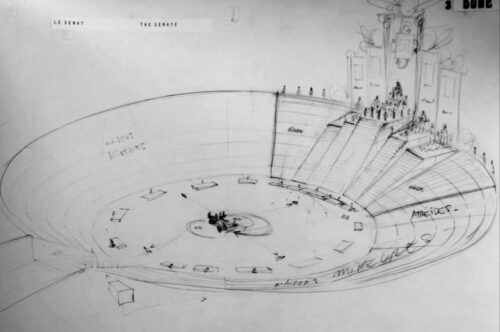The Great Houses or Houses Major are the most powerful and important houses with voting right in the Landsraad. Their number was not fixed; they varied in history with political and economic fortunes, and depended to some degree on the strength of the Empire’s basic institutions: there were as few as 35, and as many as 157. all other, lesser houses belonged to “circles of the empire,” each.
The Legate
The leaders of the Great Houses and Major Houses seldom attend the Landsraad High Council, preferring instead to send Legates or “ambassadors”. The heads of Houses Minor and Nascent Houses, in contrast, often appear in person as it represents an opportunity to meet more powerful patrons.
Legates are often Mentats – enabling them to keep track of the many factors and numbers they need and working the probabilities.
Nascent Houses
The first step for a House was to get recognition within the Landsraad. This was a process of gaining influence and money, of trading favours for a sponsorship. Once the Petition to the Council is made, the House has to follow up with commitments and repay favours before they are accepted. In reality, this is done in word only. Most new Houses enter the Landsraad owing huge debts to their sponsors and, of course, brand new enemies.
House Minor
The Minor Houses are vassal to Major Houses and Great Houses and therefore part of their voting bloc. Voting with their patron house will be expected and any votes going against their patron would be met with severe retribution. An effective Legate might use this as an opportunity to switch allegiances.
House Major
The Major Houses have considerable influence, with the resources of an entire planet behind them. They are the main focus of the “circles of the empire”. They’re powerful enough that they might be able to ignore the dictates of the Great House blocs. They might even be able to make a name for themselves standing out against their patrons.
The Great Houses
Those houses with the highest influence, the greatest military strength or the most wealth create their own voting blocs within the Landsraad. Their Legate is surrounded with an entourage of Envoys (referred to as Whips) who spend their days coaxing and chiding their voting blocs and trying to bring in new influence.
The Moot
Four times a year, the Moot is held. It lasts up to a month and is all about the politics of the Landsraad.
Due to the complexities of Imperial Life and the Landsraad, usually only one vote is taken per Standard Day. The rest of the time is negotiations, conversation, reading the Proposal and Counters.
The morning starts at 5 am, beginning with Prayer and Dedications. After this is completed (usually lasting an hour), the Legates disperse for refreshments and to confer with others.
At 10 am, the First Reading Begins. This is followed by the Second Reading.
At noon, the Legates again disperse, breaking for lunch, which is again an excuse for conversation, for bullying and for instruction in the circles.
At 5 pm, the Vote takes place. After the significant preamble of the day, the Vote itself is almost instant with multiple Mentats counting the results. After the vote, the Legates again break for refreshments. This is the Reward or Retribution phase when Legates and their Envoys find their vassals and remind them of their vote.
At 7 pm, the results of the Vote are presented to the Emperor who will either Accept or Refuse them. It’s uncommon for the Emperor to refuse a Vote result, but not unheard of. As most Votes end in the most frustrating stalemates, the Emperor is seldom even present for this part of the Moot and instead his Delegatus is a stand-in.
At 10 pm the Moot is dissolved for the Day. The Vote results are disseminated to the Empire.
Scenario Ideas
What are ways you can get players involved in the Landraad and the High Council.
Come to the Moot
The Players House Leader or Legate is attending the Moot because there’s an important vote, maybe their own sponsored Bill (Privata Libellum). The Players are the escorts, the administration. They’ll be involved in the intrigues at their level as well as those at the higher and lower levels. BGs will be informed the way the BG wants a vote to go and to influence their Legates. Plenty of opportunity for intrigues.
Fix This
The vote isn’t going to go well. There are some Vassals who aren’t towing the line. Some of them just disagree with it while some of them are being courted by other major houses to influence the vote. Their Legate is clear:a list of names and only couple of hours to fix it.
Truth and Consequences
There’s an attack on the entourage. The Legate had signalled their intention to vote a certain way and someone doesn’t like it. The enemy could be a rival house, or even a liege house. The severity of the attack depends on the outcomes. The Vote involved could be important or it could be entirely trivial – it’s not about the vote – it’s about the message the attack carries.
Retribution
The Vote went the wrong way and the Legate wants blood. Punishment, murder are all on the table. Vassals beware!

